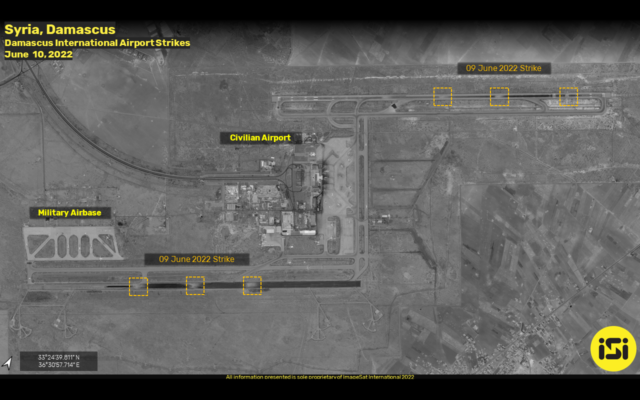Damascus Airport Strike Reflects a Shift in Israeli Policy
Israel hopes to lead Assad to the conclusion that he will pay a higher price for the Iranians’ continued activity in his country than he will for confronting them.
by Yoav Limor
JNS
 Israeli F-16s struck Damascus International Airport runways
Israeli F-16s struck Damascus International Airport runways
The central goal of the Israeli Air Force’s alleged strike on Thursday night was not Iran, but Syria. By striking the runways at Damascus International Airport and suspending flights for hours, Israel may have sought to pressure Syrian President Basher Assad into adopting a more active and assertive position against Iran’s use of its territory and infrastructure to continue to smuggle arms to Hezbollah and various other powerful elements inside Syria.
In this alleged attack, one can identify a certain shift in Israeli policy. While Syrian infrastructure has been targeted in previous strikes, this time the damage appears to have been collateral.

If Syrian anti-aircraft batteries posed a risk to Israeli jets, they were struck, and if Iran or its emissaries acted from Syrian facilities, those facilities were attacked.
Israel Defense Forces Chief of Staff Lt. Gen. Aviv Kochavi has said that in recent weeks the military carried out a double-digit number of strikes in the region. One can assume a significant number of those targeted Iranian activity in Syria.
While such strikes certainly cost the Iranians quite a few assets and abilities, they did not change Tehran’s strategic decision to surround Israel with a ring of missiles.
In the seven years since it began, the IDF’s “campaign between the wars” has recorded quite a few achievements. The intelligence infiltration that allowed for thousands of attacks did serious harm to Iran’s plan to establish permanent bases and armed militias inside Syria, and significantly disrupted its weapons convoys to Hezbollah. On the other hand, it failed to dissuade the Iranians from continuing their efforts.
The aim now, therefore, is to exert further pressure via the Syrian government. To lead Assad to draw the conclusion that the direct price he will pay for Iran’s continued activity in his country will be higher than the price of confronting them.
However, Assad owes the Iranians his life—they came to his aid during his most difficult hour in the Syrian civil war. Moreover, even if Assad was interested in ousting Iran as some in Israel believe, it’s unlikely he would succeed. Syria is weak, broken, and rotten from the inside, and Iran is now deeply entrenched in the country.
The Russians, who could assist Assad in this effort, have shown no interest in the issue. They are busy fighting in Ukraine and will not confront the Iranians on what they currently regard as a minor issue.
This, as usual, leaves Israel alone in the campaign, and demands that it return to the drawing board.
In this respect, the fact that a nuclear deal between Iran and western countries has not been renewed and sanctions on Tehran remain in place plays in Israel’s favor, allowing it to operate with relative freedom in its efforts to deter Iran and stop its dangerous activity.
No comments:
Post a Comment